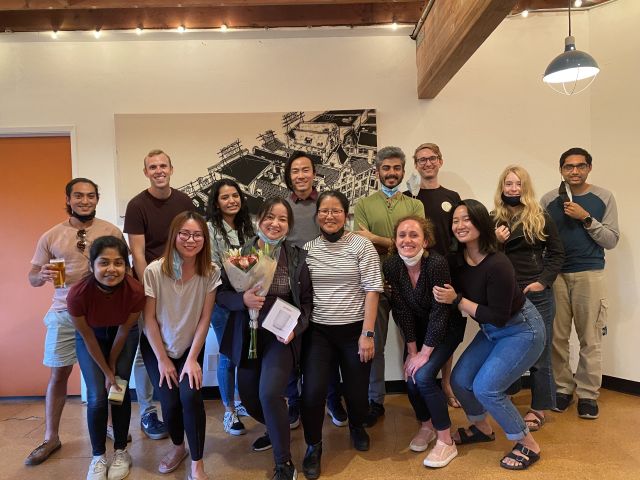Yuanxin (Miranda) Li Completes Her Ph.D. for "Dynamic Nuclear Polarization
Congratulations to Dr. Yuanxin (Miranda) Li on completing her Ph.D.!

Miranda joined the Han Lab in 2016 after graduating from Zhejiang University, China. Miranda’s research focus at the Han Lab has been on method development of Dynamic Nuclear Polarization (DNP) enhanced NMR to study complicated bio-solid systems. The bio-solid system she is probing is the tau aggregation pathway, which is associated with Alzheimer's diseases. Miranda’s approach is to design a DNP spin system to overcome the low sensitivity issue of NMR spectrum of tau aggregates.
Miranda’s dissertation is on the topic "Dynamic Nuclear Polarization Methods Development for Achieving High NMR Signal Sensitivity". Dynamic nuclear polarization (DNP) enhances NMR signal sensitivity through transferring the high polarization of electron spins to nuclear spins using microwave (µw) irradiation as a perturbation via different DNP mechanisms. Current DNP efficiency is still far from the theoretical limit (660 for 1H NMR), a major focus in DNP research is to develop methods that can maximize DNP enhancements at conditions germane to solid-state NMR, at high magnetic fields, with fast magic angle spinning (MAS), and under variable temperatures
During her defense, Miranda demonstrated how she has developed and standardized a workflow to diagnose DNP mechanisms and improve their efficiencies. Using the developed workflow, Miranda has improved the existing Cross Effect (CE) DNP efficiency significantly by rationally tuning the the EPR spectral density of mixed broad (TEMPO) and narrow (Trityl)-line radicals, suggesting a novel polarizing agent design of one Trityl tethered to at least two TEMPO moieties. Additionally with the DNP mechanisms improvements and instrumentation advancements, Miranda demonstrated how she has further applied DNP enhanced NMR to study biological samples as well as inorganic silica nano-particles, where tens to hundreds of DNP enhancements were achieved in all the tested samples.
Miranda has been a fantastic motivator and guiding light. Her help and support, plus sunny personality, brightened the Han lab. All members of the Han Lab will miss her enormously.
Congratulations again, Dr. Yuanxin (Miranda) Li!